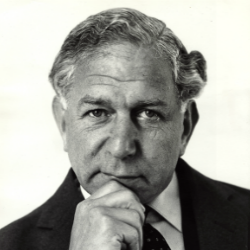
While his empirical and consistent approach won him admirers, especially when it was supported by results, it also caused ideological conflict. In a new situation or with one sympathetic person in command, it was easy for the scientific approach to get a fair hearing; but many problems are perennial and contested or have collaborative authority such as the Allied operations, deeply frustrating obstacles to a scientist. Yet having found someone who understood the scientific challenges faced in making big decisions and developing strategy, several wanted Solly to join their future endeavours, even where they ranged outside his scientific expertise.
In the second volume of his autobiography, which begins where the war ended, his activity becomes much less linear, pursuing a portfolio of activities in academia, government and the Zoo. It becomes clear that for all he has learnt, his advice is favoured for his reliability and familiarity rather than expertise in the matter in hand – in a way he is regarded as ‘tame’. This being unsatisfactory, he was determined to maintain his academic research, thus his independence, leading him to turn down an immediate installation in a full time policy role. Yet he remains committed to the development of the use of scientific advice in government and his own understanding of problems faced which could be approached scientifically, so he often responded to requests to join specific reports and committees.
Much of the need for scientific advice came in the guise of post war planning, refocusing industrial activity and improving the supply of scientific manpower. Then as now, the question of increasing undergraduate intakes and the reduction of standards is raised. However, both he and Sir John Cockroft (OM Nobel KCB CBE etc) agreed they would have no chance of passing the entrance exam for Cambridge University at the time, giving some confidence that the standards were maintained. More difficult were the balance of over/underproduction in agriculture and the question of population growth: and so his advisory work took an increasing interest in economics and social science, forecasting under uncertain models of growth and future possibilities.
An interesting case is the construction of the Thames barrier which was debated in cabinet on the ‘x in a million’ chance of being needed. Harold Wilson, Prime Minister, and a future president of the RSS, is described as giving a tutorial in probability to the other members. This might be seen as a remarkably good use of scientific advice, albeit bolstered by its use against rising tides which were not predicted at the time. Indeed it was Wilson who drew Solly into the formal role and lionised him at the same level as a permanent secretary with an office at hand, also insisting that he would need to go to the Lords should he ever try to retire, a refrain subsequently taken up by other parties.
While old favourites such as badgers transmitting TB to cattle make their appearance, generally problems are on a larger scale and depend on external factors, but even they are hardy perennials: The brain drain of scientific expertise associated with changes in research and development spending – even if projects are uncompetitive they had to be maintained; Population growth and its consequences from food imports to contraception; Environmental pollution, from industrial effluent to smoke from furnaces; And of course cooperation in science between East and West. All of these require diplomatic skills and a network of contacts rather than specific expertise, although this last was often presumed in the form of understanding and being able to explain the technicalities. By the end, Zuckerman was drawn into his own political concerns, particularly nuclear non-proliferation, perhaps a strange preoccupation for a scientist but also useful to have someone who knows the difference in risk posed by reactors and bombs at the heart of government – still a nicety lost on many in positions of power.
Perhaps this comes to the heart of a government's need for scientific advice: government scientists can provide the science in specific areas, but when there is a complex and uncertain interdisciplinary problem, involved advice is required. There are commonalities amongst the challenges and solutions: systems thinking and continuous evaluation are necessary but new disciplines and an increasing embrace of social science are extending the breadth of science used. So a scientific advisor needs experience as a scientist, but that experience needs to extend beyond solving problems in their own discipline, thus they know when and how to get advice themselves and have a network to seek it from. What distinguished Solly was his own interest in the outcomes, in making science useful and harnessing the ‘white heat of technology’ to make life better while monitoring risks and consequences.
We now have a national risk register to formalise monitoring but many problems remain unresolved, partly for their social and political aspects which naturally change with time. Scientific advice seems now to concentrate on topics of health, environment and energy, perhaps all coming under the heading of risks, although most departments have their own external scientific advisor. But of course defence may still be there, we just won't hear of it until 30 years have passed, and it is no longer an ‘official secret’. The life of Solly Zuckerman is clearly history, in some ways a 'boy's own adventure' but jolly good fun for that, yet it has many lessons to teach current scientists thinking of interacting with government: I thoroughly recommend his books to anyone reflecting on science in government.




